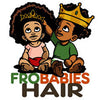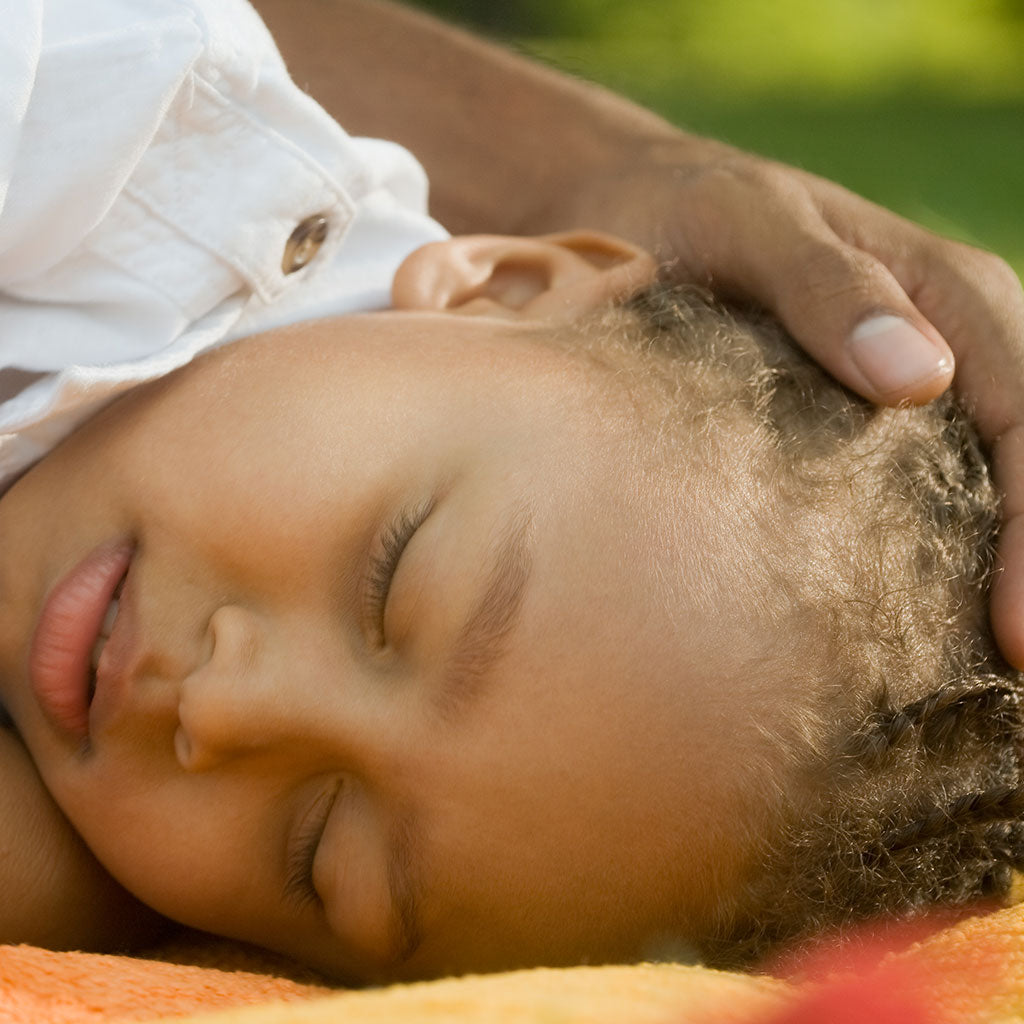While their symptoms are similar, dandruff and dry scalp are two completely different conditions. Both can cause flakes and itching that is uncomfortable for your little one. The tips below will help you determine which condition your curly haired cutey is struggling with and how to provide them with rapid relief.
What Is Dandruff?
Dandruff is a chronic medical condition that once diagnosed you can treat and take a proactive approach to. It’s a type of seborrheic dermatitis often caused by:
- Overactive oil glands
- Fungal growth
- Stress
- Irritation from harsh hair care products
Anyone can get dandruff. We all have oil glands on our scalp as well as naturally-occurring fungus. Our body regulates both oil and fungus, but the factors above can throw their natural balance out of whack. Since you wash your curly kid’s hair less often, it creates an ideal environment for oil and fungus to grow.
Your child likely has dandruff if they are experiencing:
- Itchy scalp
- Itchy eyebrows
- Large and visible white flakes
- Red and irritated skin
Before we get into how to treat dandruff, let’s take a look at dry scalp symptoms.
What Is Dry Scalp?
Dry scalp is easily confused with dandruff, but is a non-medical condition caused by excessively dry skin. This can affect the entire scalp or just a dry or itchy section. The most common causes are:
- Climate change to dry or harsh temperatures
- After-effect of a sunburn
- Skin allergy or sensitivity to hair care products
- Over-washing the hair and scalp
For example, if your child was out playing in the sun and got a sunburn on their pigtail part, it will likely itch and flake as it heals. Or you may find that one or more of your children struggles in the winter months.
Your child likely has dry scalp if they are experiencing:
- Itchy scalp
- Irritated scalp
- Small flakes
- Their hair is also dry
If you have a difficult time determining if your child has dandruff or dry scalp, head to a dermatologist.
How To Treat Dandruff?
You may have to test a variety of methods to resolve your child’s dandruff, creating both reactive and proactive approach solutions.
- Medicated Shampoo—curly kids must use gentle hair care products, but if they are super itchy and irritated a medicated shampoo will rapidly soothe the itch and irritation. You can find dandruff shampoo formulas online, in grocery stores, and at Target, Walmart, drug stores. ONLY apply it to their scalp so that it does not strip or damage their sensitive curls and follow up with a leave-in or rinse out conditioner designed for curly hair. Use 2 times a week until their dandruff subsides.
- Aloe Vera—apply pure aloe vera directly to their scalp when it’s itchy, and even overnight to soothe and heal.
- Add Essential Oils To Their Curly Kid’s Products—once you get their dandruff under control you can add a few drops of antifungal tea tree or peppermint oil to their natural hair care products as a proactive approach.
- Antifungal Oil—one of the reasons coconut and jojoba oil are popular for natural hair LOC methods, is because they are both antifungal and help keep scalp pH balanced. It’s also why Fro Babies Hair is formulated with antifungal avocado oil!
- Nutrition—ensure your little one has at least 3 servings a week of Omega-3s to help regulate natural oil production. This means eating more walnuts, avocado, and fish. Kids should also get out in the fresh air for 10 to 30 minutes every other day or so to ensure they get enough vitamin D, which slows the rate of rapid skin cell growth. If not sunlight, discuss a supplement with your pediatrician.
- Reduced Stress—if dandruff symptoms don’t rapidly improve stress may be the cause. Work with your healthcare team to teach your child tools and techniques to manage their stress.
How To Treat Dry Scalp?
The cause of your child’s dry and itchy scalp will determine the solution. Turn to one or more of the tips below to minimize their itch and irritation:
- Aloe Vera—apply pure aloe vera directly to their scalp when it’s itchy, and even overnight to soothe and heal.
- Switch To Curly Kid’s Products—if their hair and scalp are dry and you are currently using standard hair products, it’s time to switch to a gentle, natural, and sulfate-free hair care line designed especially for curly kids. Fro Babies has an entire line for children 12 months and older.
- Preepoo Their Hair And Scalp—there are a few pre-shampoo treatments that will help to minimize itch. The first is to saturate your preferred antifungal oil (avocado, coconut, or olive oil) to their hair and scalp and let it sit for 20 minutes before you shampoo. Or do the same with pure aloe vera gel or an apple cider vinegar mixture. Add 3 parts of ACV and 1 part water to a spray bottle and comb through. Be sure you apply your prepoo to their scalp too.
- Adjust Their Shampoo Schedule—most curly kids only need to wash their hair every 7 to 10 days. There are exceptions to this rule, but if you are over washing their hair, their scalp will dry out. Over time, the damage to their hair will be beyond repair.
- Get A Humidifier—if the skin on your child’s body is also dry and itchy, consider getting a humidifier. This could be a large humidifier in your living room, or a small humidifier placed in their bedroom while they sleep. Just be sure you understand how to clean and maintain your humidifier so that mold growth is not an issue.
Turn to the tips above for a week or two, but if their condition persists or worsens head into your dermatologist as there are other factors that can cause itchy scalp. If your little one’s symptoms are severe a prescription product may be required to provide immediate relief.



Leave a comment